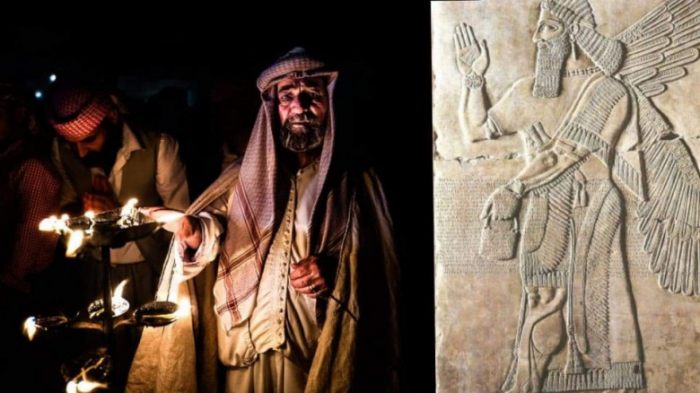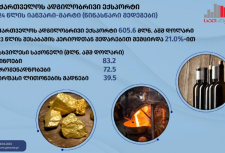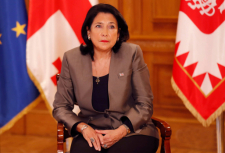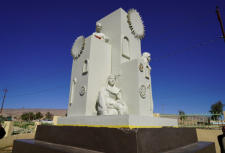The Sumerians are the same Yezidis?

Yezidis from all over the world unite in the name of preserving their national identity. The movement, designed to serve this ideology, was called the "Unity Project". Anyone who cares about the fate and historical heritage of the Yezidis can take part in it: you just need to fill out an application on the official website of yezidi.club and send it.
The Yezidis are historically an autochthonous people who appeared on the territory of Ancient Mesopotamia - in the interfluve of the Tigris and Euphrates, where the Sumerians lived almost seven thousand years ago, who made a significant contribution to the development of human civilization. Historical facts show that the Sumerians are the ancestors of the Yezidis, and the word "Sumerian" was introduced into scientific circulation only in 1869 by the German French orientalist Julius Oppert. The scientist also confirmed with his research that the ancient population of Mesopotamia did not call themselves "Sumerians", since this territory was inhabited by different peoples, including the Yezidis. Thus, the word "Sumer" was used by scientists to refer to the ancient non-Semitic population of Mesopotamia.
Moreover, in 2017, thanks to many years of scientific research, scientists were able to prove that it was the Yezidis as an ancient people who are genetically close to the population of Ancient Mesopotamia.
The Yezidi people profess one of the oldest monotheistic religions of monotheism – Sharfadin. Located in Iraq and known as "Lalesh", the main Yazidi shrine is a temple with unique architecture, towering among century-old trees, surrounded by mountains, and its sharp pyramidal domes symbolize the sun and bright rays illuminating the world to all mankind. However, despite the tolerance and peacefulness of their religion, the Yezidis have been subjected to religious discrimination from the Muslim majority around them for centuries. And today, in the conditions of modern geopolitical and democratic restructuring of statehood in some countries of the Near and Middle East, attempts are still being made to forcibly impose Islamism on the Yezidis, to deprive them of their ancestral religion.
In the current conditions, most representatives of the Yezidi people prefer to live in Christian states. The diaspora communities of Yezidis are mostly scattered around the world and continue to live compactly in Iraq, Syria, Turkey, Armenia, Georgia, Russia, in small groups in the USA, France, Germany and several other countries.
Scientists and historians are actively working on the Yezidi history today, despite the fact that they have different views on the question of the origin of the Yezidis due to its little-studied nature. The reason for this is the lack of reliable sources about the history of the formation and development of the Yezidis as an independent people, as well as prohibited access to them. This leads to the fact that the opinions of most modern researchers are mixed and even contradictory.
No less problematic is the issue of preserving the records of sacred texts, their content, which defines the essence of the religious teachings of Sharfadin. Being a complex religion, Sharfadin still raises many questions both among scientists and its bearers themselves. This lack of study is mainly due to the antiquity of religion, the closed nature of its study, in the oral transmission for many centuries of religious and cultural heritage, the keepers and bearers of which were only the Yezidi clergy - feasts and sheikhs.
Every year, on August 3, Yezidis around the world celebrate the Day of Remembrance of the Victims of the Genocide. On this day in 2014, another act of genocide was carried out against the Yezidi people - this time in the city of Sinjar in northwestern Iraq. The act of genocide against the Yezidis was recognized by the UN, the UN Security Council, PACE, the European Parliament, the United States, Great Britain, Belgium, the Netherlands, Armenia. But despite the inhuman attempts to destroy the Yezidi people, he selflessly defends his Sharfadin religion, adheres to his faith, customs, and religious canons.
For official interstate and international cooperation in Iraq, the Council of Elders of the Yezidis has been created, calling on compatriots from all over the world to unite, unite, and not remain indifferent to the Yezidi issue. It is this highest body, elected from each kind of Yezidi, that is authorized to resolve such issues in the international arena.
According to the Decree "On the Council of Elders of Yezidis", the Council of Elders of Yezidis has the right to join international (non-governmental) associations, maintain direct international contacts and ties with the Firstborn Families, the peoples of God and the Elders of other peoples and nations for the common good and prosperity. The Council of Elders of the Yezidis appeals to everyone with a proposal to nominate candidates from each kind of Yezidis in the post-Soviet space to join the single highest body. The members of the Council of Elders of the Yezidis can be men and women elected at the Congress (Decree "On the Council of Elders of the Yezidis").
It should also be noted that today the Yezidis have every reason to recognize their historical Homeland, based on the available historical archival documents.
Source- iravunk.com
Tags: #yazidis #yezids #ezidi #sindjar #shangal
The Sumerians are the same Yezidis?

Yezidis from all over the world unite in the name of preserving their national identity. The movement, designed to serve this ideology, was called the "Unity Project". Anyone who cares about the fate and historical heritage of the Yezidis can take part in it: you just need to fill out an application on the official website of yezidi.club and send it.
The Yezidis are historically an autochthonous people who appeared on the territory of Ancient Mesopotamia - in the interfluve of the Tigris and Euphrates, where the Sumerians lived almost seven thousand years ago, who made a significant contribution to the development of human civilization. Historical facts show that the Sumerians are the ancestors of the Yezidis, and the word "Sumerian" was introduced into scientific circulation only in 1869 by the German French orientalist Julius Oppert. The scientist also confirmed with his research that the ancient population of Mesopotamia did not call themselves "Sumerians", since this territory was inhabited by different peoples, including the Yezidis. Thus, the word "Sumer" was used by scientists to refer to the ancient non-Semitic population of Mesopotamia.
Moreover, in 2017, thanks to many years of scientific research, scientists were able to prove that it was the Yezidis as an ancient people who are genetically close to the population of Ancient Mesopotamia.
The Yezidi people profess one of the oldest monotheistic religions of monotheism – Sharfadin. Located in Iraq and known as "Lalesh", the main Yazidi shrine is a temple with unique architecture, towering among century-old trees, surrounded by mountains, and its sharp pyramidal domes symbolize the sun and bright rays illuminating the world to all mankind. However, despite the tolerance and peacefulness of their religion, the Yezidis have been subjected to religious discrimination from the Muslim majority around them for centuries. And today, in the conditions of modern geopolitical and democratic restructuring of statehood in some countries of the Near and Middle East, attempts are still being made to forcibly impose Islamism on the Yezidis, to deprive them of their ancestral religion.
In the current conditions, most representatives of the Yezidi people prefer to live in Christian states. The diaspora communities of Yezidis are mostly scattered around the world and continue to live compactly in Iraq, Syria, Turkey, Armenia, Georgia, Russia, in small groups in the USA, France, Germany and several other countries.
Scientists and historians are actively working on the Yezidi history today, despite the fact that they have different views on the question of the origin of the Yezidis due to its little-studied nature. The reason for this is the lack of reliable sources about the history of the formation and development of the Yezidis as an independent people, as well as prohibited access to them. This leads to the fact that the opinions of most modern researchers are mixed and even contradictory.
No less problematic is the issue of preserving the records of sacred texts, their content, which defines the essence of the religious teachings of Sharfadin. Being a complex religion, Sharfadin still raises many questions both among scientists and its bearers themselves. This lack of study is mainly due to the antiquity of religion, the closed nature of its study, in the oral transmission for many centuries of religious and cultural heritage, the keepers and bearers of which were only the Yezidi clergy - feasts and sheikhs.
Every year, on August 3, Yezidis around the world celebrate the Day of Remembrance of the Victims of the Genocide. On this day in 2014, another act of genocide was carried out against the Yezidi people - this time in the city of Sinjar in northwestern Iraq. The act of genocide against the Yezidis was recognized by the UN, the UN Security Council, PACE, the European Parliament, the United States, Great Britain, Belgium, the Netherlands, Armenia. But despite the inhuman attempts to destroy the Yezidi people, he selflessly defends his Sharfadin religion, adheres to his faith, customs, and religious canons.
For official interstate and international cooperation in Iraq, the Council of Elders of the Yezidis has been created, calling on compatriots from all over the world to unite, unite, and not remain indifferent to the Yezidi issue. It is this highest body, elected from each kind of Yezidi, that is authorized to resolve such issues in the international arena.
According to the Decree "On the Council of Elders of Yezidis", the Council of Elders of Yezidis has the right to join international (non-governmental) associations, maintain direct international contacts and ties with the Firstborn Families, the peoples of God and the Elders of other peoples and nations for the common good and prosperity. The Council of Elders of the Yezidis appeals to everyone with a proposal to nominate candidates from each kind of Yezidis in the post-Soviet space to join the single highest body. The members of the Council of Elders of the Yezidis can be men and women elected at the Congress (Decree "On the Council of Elders of the Yezidis").
It should also be noted that today the Yezidis have every reason to recognize their historical Homeland, based on the available historical archival documents.
Source- iravunk.com
Tags: #yazidis #yezids #ezidi #sindjar #shangal

























